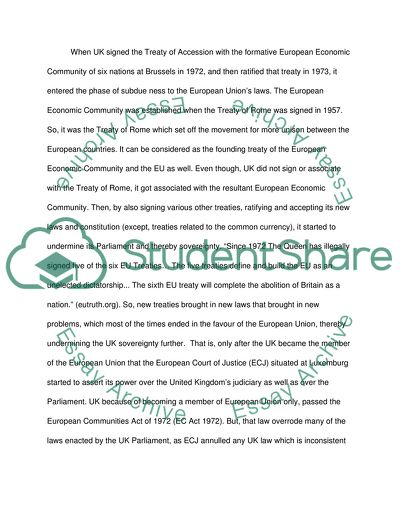Cite this document
(To What Extent has the United Kingdom Ceded Sovereignty to the European Union as a result of the European Communities Act 1972 Essay Example | Topics and Well Written Essays - 1250 words, n.d.)
To What Extent has the United Kingdom Ceded Sovereignty to the European Union as a result of the European Communities Act 1972 Essay Example | Topics and Well Written Essays - 1250 words. https://studentshare.org/law/1718394-law-assignment-to-what-extent-has-the-united-kingdom-ceded-sovereignty-to-the-european-union-as-a-result-of-the-european-communities-act-1972
To What Extent has the United Kingdom Ceded Sovereignty to the European Union as a result of the European Communities Act 1972 Essay Example | Topics and Well Written Essays - 1250 words. https://studentshare.org/law/1718394-law-assignment-to-what-extent-has-the-united-kingdom-ceded-sovereignty-to-the-european-union-as-a-result-of-the-european-communities-act-1972
(To What Extent Has the United Kingdom Ceded Sovereignty to the European Union As a Result of the European Communities Act 1972 Essay Example | Topics and Well Written Essays - 1250 Words)
To What Extent Has the United Kingdom Ceded Sovereignty to the European Union As a Result of the European Communities Act 1972 Essay Example | Topics and Well Written Essays - 1250 Words. https://studentshare.org/law/1718394-law-assignment-to-what-extent-has-the-united-kingdom-ceded-sovereignty-to-the-european-union-as-a-result-of-the-european-communities-act-1972.
To What Extent Has the United Kingdom Ceded Sovereignty to the European Union As a Result of the European Communities Act 1972 Essay Example | Topics and Well Written Essays - 1250 Words. https://studentshare.org/law/1718394-law-assignment-to-what-extent-has-the-united-kingdom-ceded-sovereignty-to-the-european-union-as-a-result-of-the-european-communities-act-1972.
“To What Extent Has the United Kingdom Ceded Sovereignty to the European Union As a Result of the European Communities Act 1972 Essay Example | Topics and Well Written Essays - 1250 Words”. https://studentshare.org/law/1718394-law-assignment-to-what-extent-has-the-united-kingdom-ceded-sovereignty-to-the-european-union-as-a-result-of-the-european-communities-act-1972.


